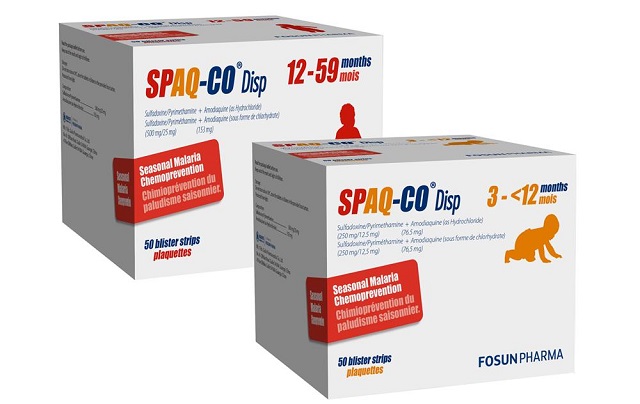
The combination therapy for seasonal malaria chemoprevention is made in Kenya
Kampala, Uganda | THE INDEPENDENT | A leading Kenya-based pharmaceutical manufacturer, Universal Corporation Ltd (UCL), has become the first African manufacturer to gain WHO prequalification for their sulfadoxine-pyrimethamine + amodiaquine product.
Sulfadoxine-pyrimethamine + amodiaquine (SPAQ) is a combination drug used to prevent malaria in children living in areas of seasonal malaria transmission.
The combination therapy is employed in seasonal malaria chemoprevention (SMC) programmes and is designed to protect children by clearing existing infections and preventing new malaria infections during the season of greatest risk.
Universal Corporation’s WHO-prequalified SPAQ is a game changer because, according to expert reports, it can boost SMC programmes, improve access to quality medicines, support malaria prevention, reduce morbidity and mortality, strengthen global supply chains, and promote local economic development.
Universal Corporation is part of Strides Pharma Science Limited (Strides, the Indian pharmaceutical company, headquartered in Bangalore, southern India, which manufactures pharmaceutical products, over-the-counter drugs and nutraceuticals. Strides has 15 manufacturing sites in six countries and marketing presence in 50 countries, including the USA and Canada.
Universal Corporation is supported by Medicines for Malaria Venture (MMV), a not-for-profit public-private partnership involving the governments of Switzerland and The Netherlands and the Department for International Development (UK), the World Bank, and Rockefeller Foundation. The MMV was established as a foundation in Switzerland in 1999 to reduce the burden of malaria in disease-endemic countries by developing and facilitating the delivery of antimalarial drugs.
Receiving prequalification from the World Health Organization (WHO) for its product, SPAQ is a historic achievement that makes UCL the first Africa-based manufacturer to attain it for this life-saving malaria treatment.
Prequalification is a WHO programme established to apply standards of quality, safety and efficacy of medicinal products.
According to most reports, the WHO recognition demonstrates UCL’s commitment to maintaining the highest quality standards in the production of antimalarial drugs.
It is a welcome step, boosting regional production capabilities and providing greater access to essential medicines within the African continent, where about 95% of all malaria cases and 96% of deaths from malaria occur.
“Universal Corporation Ltd is committed to advancing the fight against malaria and improving the health and well-being of communities across Africa. The WHO prequalification of our SPAQ production is a significant step forward in achieving these goals,” Perviz Dhanani, Founder and Managing Director of UCL was quoted in a press released statement.
SPAQ is a vital component in the fight against malaria, particularly through SMC programmes. Timely delivery of SPAQ is critical, considering its administration must sync with the seasonal period of peak malaria transmission (typically 4-5 months) and involves the distribution of millions of doses to multiple African countries.
The logistical complexity of SMC delivery campaigns is amplified by the large number of children requiring this preventive medicine.
“Local manufacturing plays a pivotal role in improving public health in Africa, and the WHO prequalification of Universal Corporation Ltd’s SPAQ production is a notable accomplishment. This milestone not only demonstrates the continent’s resolve to strengthen the self-sufficiency of its public health systems but also boosts confidence in locally manufactured products aligning with the African Union Agenda 2063 ambitions,” said Dr Jean Kaseya, Director General of the Africa Centres for Disease Control and Prevention (Africa CDC).
Recent studies also show that offering SPAQ in combination with RTS,S or R21, the two malaria vaccines recommended by WHO, increases protection among children under 5 compared to either intervention alone. UCL’s new status as a manufacturer of prequalified SPAQ has the potential to ensure that more children will be protected during the rainy season.
Until recently, WHO recommended SMC only for children from 3 months to 5 years old. However, in June 2022, WHO updated its guidance to recommend this intervention for any child at high risk of severe malaria in areas of seasonal malaria transmission. This expansion resulted in more than 48 million children being protected from malaria, significantly reducing the burden of this deadly disease.
David Reddy, CEO of Medicines for Malaria Venture, expressed his enthusiasm for this milestone stating, “The WHO prequalification of UCL’s SPAQ is a significant achievement in our efforts to combat malaria in Africa. By expanding the availability of high-quality, locally manufactured anti-malarial drugs, we can strengthen SMC programmes and ensure that any child at high risk of malaria in areas of seasonal transmission is protected from the devastating impact of this disease. This achievement is a testament to the dedication and expertise of UCL and the ongoing collaboration between MMV and African manufacturers.”
The prequalification of UCL’s SPAQ could contribute to the expansion of SMC programmes across Africa. With increased access to WHO-prequalified drugs, more children will receive the necessary protection against malaria during the high transmission season, leading to a significant reduction in malaria-related illnesses and deaths.
 The Independent Uganda: You get the Truth we Pay the Price
The Independent Uganda: You get the Truth we Pay the Price


